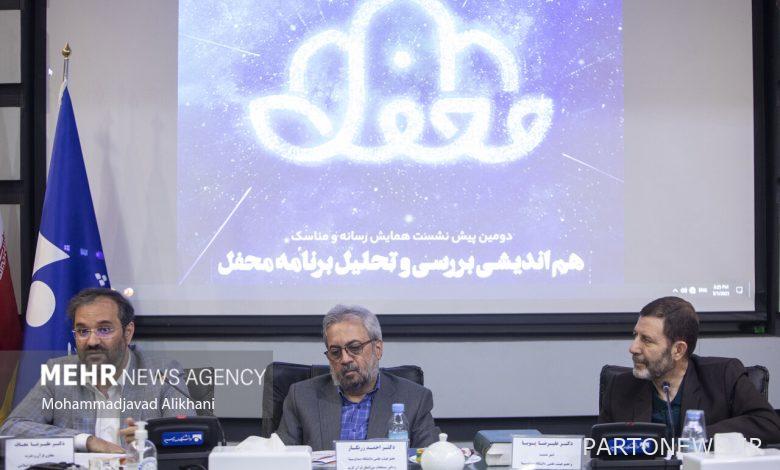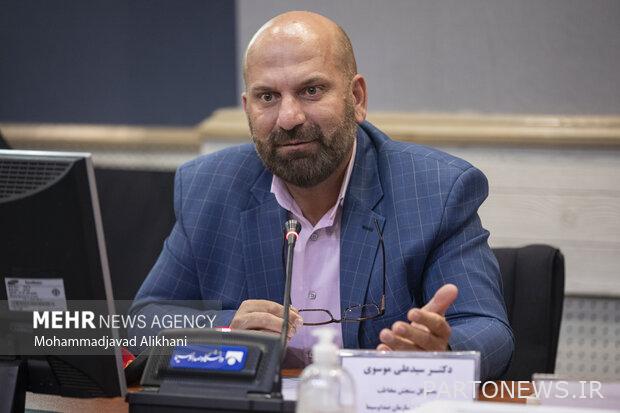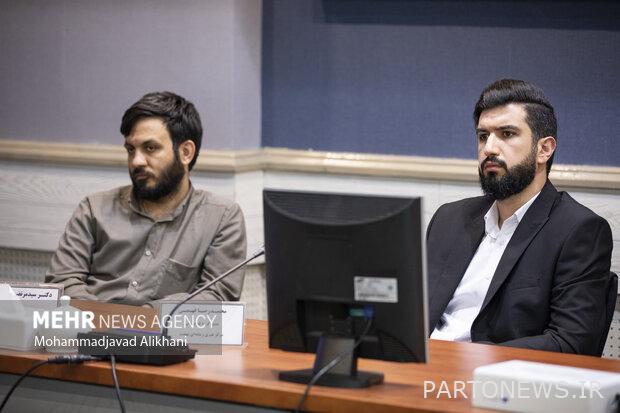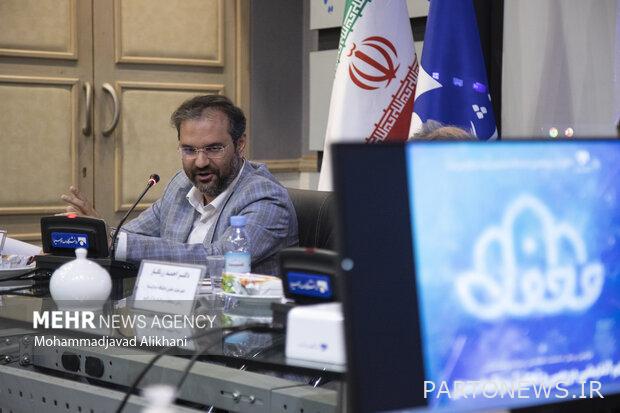Teachers’ frank and unconventional comments about “Mahfel”/Afarin, but be careful! – Mehr news agency Iran and world’s news

According to Mehr reporter, a joint review and analysis meeting of “Mahfel” program was held last Monday evening, May 11th, with the presence of a group of university professors at Sedavasima University.
Ahmad Zarangar, a professor at the University of Broadcasting and Broadcasting, said at the beginning of this program, pointing out that he is also a reciter of the Qur’an: We have both a general audience and a special audience, and a program like “Mohfel” is very attractive to the general audience. The actions and reactions between the experts and the participants in the program were fascinating.
Some official and stereotyped formats were broken
He continued: Of course, these had some damages that experts were well aware of, but overall this program was attractive. There was a variety in the recitations and presentation of concepts, which broke some formal and stereotyped formats.
This university professor recalled: The fact that this program was broadcast on Channel Three made it attract a lot of viewers, and maybe if it was broadcast on another channel, it would not have had this amount of viewers. The presence of faces in the composition of the program’s guests helped its success. The same people who came to the stage and the movement center had identified them. Like the Honeymoon program in which a group of subjects was identified.
Zarangar continued: For example, a participant would recite and after that an emotional scene would be created. At the same time, Mr. Abul Qasimi came and kissed the participant’s hand. All this together created an attraction that, relying on it, the program was able to take advantage of all the attractive items in some way.
He added: There should be an approach in radio and television that we don’t make such programs only in the holy month of Ramadan and that their production is continuous throughout the year. Especially since one of the other successes of the program was that people noticed the Quranic activities. Of course, the fact that 30 programs were broadcast with five fixed experts may be too long, and the experts could have been changed every 10 nights to create more variety.
In the end, Zarangar clarified: the form and content of the “Mohfel” program was scattered in some places. Some of the comments were not very expert, and a Quranic academic board is required to be formed to continue the production of this program. In the broadcasting organization, I also suggest to use Quranic veterans more.
All programs should not be directed towards gathering
Seyed Ali Mousavi, director general of the audience measurement of the Broadcasting Research Center, said in a speech: In television programming, works and formats that are in the theoretical and documentary space, usually have patterns that make it less difficult to enter them, but educational themed programs, It has more difficulties. To have a program that brings the Qur’an to people’s lives, and its expert accompanies the subjects and goes step by step with them, we rarely had these in TV programs. Breaking the mold that occurs in the field of execution and production, such as the accompaniment of experts, was one of the things seen in this program.

He clarified: Of course, we have to take care that all our plans do not go towards party building. If the audience is waiting for “life after life”, because it takes a year, the viewer will be able to see this program again and it has no similar.
We proposed to make a program about the fear of jinn!
In the other part of this round table, Seyed Morteza Ahmadzadeh, the director of the education department of the Three TV channel, said: Before we start planning for the month of Ramadan, we received various suggestions. For example, one of the suggestions was to make a program about the fear of demons!
He continued: We had different topics and entering the Quranic program was a big risk for us. We were worried that the output would be such that programming for the Quran would be affected. The responsible institutions, from Quran scholars in Qom and other places to professors, each had their own considerations, and these made planning in this area difficult.
The director of the education group of Channel 3 stated: The most important factor that made the gathering a gathering was the courage that existed. The friends who accompanied us in different councils and even we got many licenses for the program, so that, for example, something happens to this program on the air and it doesn’t happen again. Most of the program production team are in their seventies. It was the trust in these young people that happened by itself.

He added: Reading the Qur’an in tertiles was one of our important considerations in this program. The recitation of the Qur’an on Channel 3 in Ramadan has about 17% of the audience, which is a high figure and is higher than some of the most popular TV programs. The production team was completely compatible with the policy-making team in terms of thought and thought, and it helped a lot to implement what the designers intended, and this was one of the reasons for success.
Ahmadzadeh clarified: In addition to being attractive, we tried to convey our revolutionary and Islamic message, which happened. What made the program successful was the Quran itself in the first, second and third reasons, and the next reason was the sincerity of the program’s production team.
The gathering was a kind of rebellion against the monopolization of educational programs
Mohammadreza Fahimi, director of the Nahdat Media Center, also emphasized that this meeting should be more about expressing criticisms of the program and said: I think the meeting was a kind of revolt against the monopolization of educational programs. With this program, we had a kind of monopoly failure in the Quranic society of the country. Previously, if the Quran was taught or read, it was all specialized and exclusive, and this caused our society and young people to move away from the Quran.
He added: If we want to consider two important components for programming, it is the audience and the goal, and Mahfil had these two points in mind. The audience had a previous mental experience of the Qur’an programs and an image made of the Qur’an, which they could not relate to. An image that captured most of the atmosphere of sadness, and now we are faced with Ramadan, which is itself a celebration and coincides with Nowruz, and a program was produced that was able to create entertainment. This program considered its audience to be the general public, which included different people, even from non-religious to religious. The hosts of the program were two generations, and we tried to be comprehensive in all cases.
Fahimi reminded: One thing needs to be said, and that is the synergy of the devices, without this collaboration, success would not have been achieved. This expansion in subject search was the reason why all the devices came to work.

They thought that the Qur’an is a musical text for the cemetery
Alireza Pouya, a member of the academic staff of Sadaosima University, also criticized the use of the Quran for mourning and said: There was this idea that the Quran is a musical text for the cemetery. Even sometimes in comedy programs, it evokes comic scenes by dragging the Quran to the cemetery. We have told them many times to fix this. My request is to be careful to spread the Quranic culture in movies and series that can be more effective.
Alireza Maaf, Deputy Minister of Quran and Atrat of the Ministry of Guidance, also stated: When you do something different, people welcome it like this. This shows that a metatextual view should be taken. Connecting with the Qur’an happens to everyone in some way and this program was able to create this space for different classes. This program changed people’s view of the work of the Quran, that the Quran does not have an atmosphere of sadness and that it is possible to create an atmosphere of happiness.
He added: The professors should talk about life in this program, they are not supposed to parrot the sentences of the Quran. A tendency towards this program has been created and now we have to direct this tendency. The fact that this program has 20% audience is really a high number, many of us have the statistics of the audience and we know how the situation is.
In the end, Maaf said: We should be aware of this so that the guests in this program do not create a stereotype that everyone thinks they should be like these people. We must pay attention to such damages
Mehr news agency in Social Networks follow

